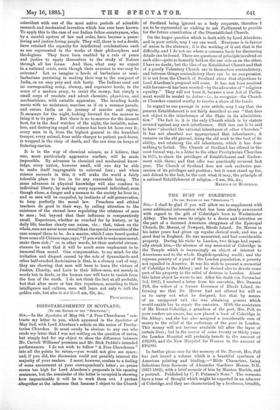DISESTABLISHMENT IN SCOTLAND.
[To THE EDITOR OF THE " SPECTATOR." _I Sxa,—In the Spectator of May 9th "A Free Churchman" contrasts my letter to you, which appeared in the Spectator of May 2nd, with Lord Aberdeen's article on the union of Presbyterian Churches. It must surely be obvious to any one who reads my letter that I was not writing on the question of union, but simply had for my object to show the difference between Mr. Carvell Williams' promises and Mr. Dick Peddie's intended performances. I do not wish to follow "A Free Churchman" into all the points he raises,—you would not give me space ; and, if you did, the discussion could not possibly interest the majority of your readers. I must, however, confess to a feeling of some amusement at your correspondent's letter ; no praise seems too high for Lord Aberdeen's proposals in his opening sentences, but the remainder of the letter is occupied in showing bow impracticable it will be to work them out. I protest altogether at the inference that because I object to the Church
of Scotland being ignored as a body corporate, therefore I am to be represented as wishing to ask Parliament to provide for the future constitution of the Disestablished Church.
On the larger question which is dealt with by Lord Aberdeen, and in your article, may I say one word. Everyone is in favour of union in the abstract; it is the working of it out that is the difficulty, and I do not See where a common basis for discussing details can be found. There are questions of principle involved on each side—quite as honestly held on the one side as on the other, I have no doubt; but the idea of an Established Church and that of a purely -Voluntary Church are in themselves contradictory, and between things contradictory there can be no compromise. It is not from the Church of Scotland alone that objections to Lord Aberdeen's proposal will come. It has not been received with favour—it has been scouted—by the advocates of "religious equality." They will not have it, because a new Act of Parliament would be needed to define—i.e., to recognise—the Church or Churches counted worthy to receive a share of the funds.
In regard to one passage in your article, may I say that the present Establishment is not fairly described as one "that does not object to the interference of the State in its administration." The fact is, it is the only Church which is by statute secured against any such interference. Still less can it be said to have "absorbed the national inheritance of other Churches." It has not absorbed nor appropriated that inheritance ; it remains on the old ground, doing the old work to the best of its ability, and retaining the old inheritance, which it has done nothing to forfeit. The Church of Scotland has offered in the most formal way, in a letter to the other Presbyterian churches in 1875, to share the privileges of Establishment and Endowment with them ; and that offer was practically reversed last year. The Church of Scotland does not seek exclusive possession of its privileges and position ; but it must stand up for, and defend to the last, be the cost what it may, the principle of a national Establishment of religion.—I am, Sir, &c.,
BALFOUR OF BuRLEIGII.


































 Previous page
Previous page